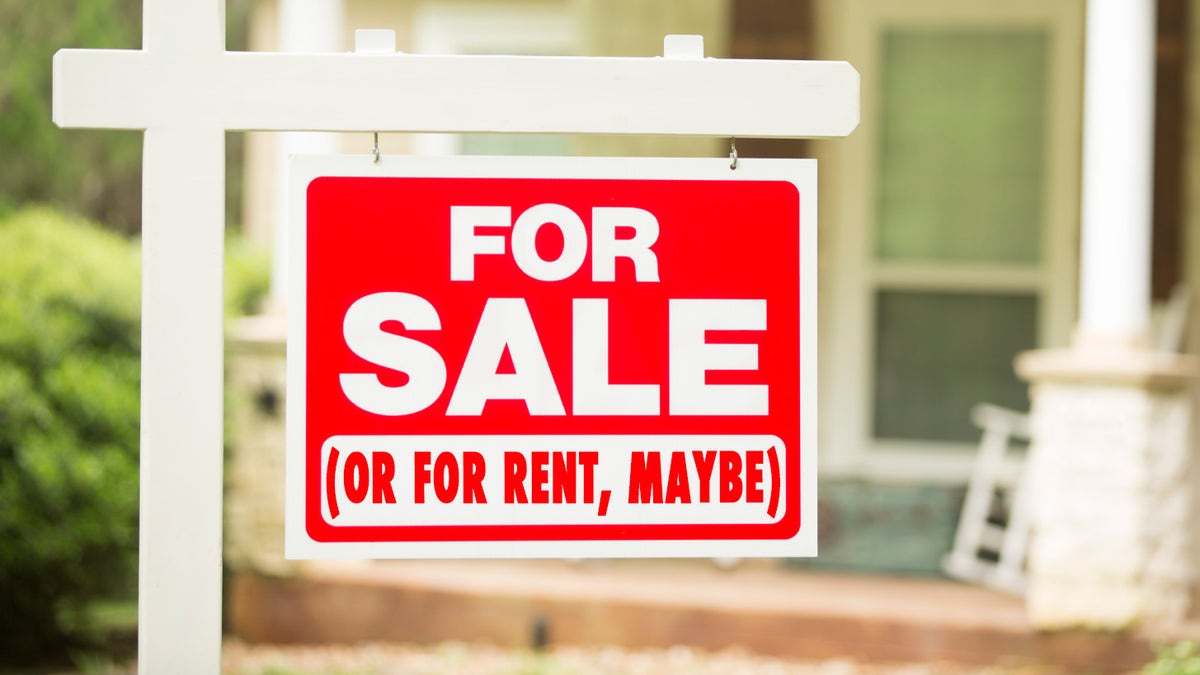
House for Sale (or rent) sign (©2015fstop123)
It's the end of the traditional summer buying and selling season, and Debbie Davis is facing a major dilemma.
The Allentown, PA, resident put her four-bedroom, three-bathroom house up for sale in March. She figured it would fly off the market -- after all, the house is spacious, well-maintained, has a fully remodeled basement, and is in a fantastic neighborhood. What's not to love?
"I did all the things that my Realtor recommended: painted and decluttered," Davis says. "A house down the street was on the market for about $30,000 more than what I was asking, and so I was optimistic." Very optimistic.
But then reality reared its ugly head. Davis' house lingered on the market, attracting no offers. Finally she decided to take the hit -- and dropped the price from $239,000 to $229,000. The result: one lowball bid.
Now Davis, a professional musician who moved several states away while her home still sits on the market, is forced to pay a mortgage on her new house (which would have been otherwise paid for with cash from the sale proceeds). And so, the dilemma: Davis' Realtor contract is up at the end of the month. Should she keep trying to sell the house, or take it off the market and rent it out?
Davis isn't alone in her quandary. It's a seller's market across the nation right now, but that doesn't mean every home is being scooped up in a nanosecond.
When your home for sale is languishing on the market, how do you know when to give up? Here are a few things you should consider before you call it quits.
Take a good, hard look at the numbers
The first thing to do is evaluate the way the house is priced, says Shannon Sharpe, a Realtor in New Orleans.
"I mean really evaluate," Sharpe says. "Look at the active competition. What else would a buyer in that price range be getting for the same amount of money? Can your house be marketed better?"
When a home is stalling on the market, it's often a price issue. Scrutinize the market before making a decision. If you're comfortable lowering the price, try selling it for three more months.
Analyze how your home was marketed
"Before you take the next step, really check what happened over the last six months," says Gary Malin, president of Citi Habitats in New York City. "Arm yourself with as much information as humanly possible."
He suggests asking a few questions:
- Were you provided with traffic reports and detailed information about the number of people who saw the house?
- What client feedback did you get?
- What advertising did you do in print as well as online?
- Do you have details on what people who viewed your property ended up buying?
Both Sharpe and Malin agree that if you aren't happy with the marketing approach, it may be time to seek another real estate professional. Approaches differ, and you might need to find someone who is better suited to your needs.
"Given that you haven't gotten the result you want, it might just not have been the right fit," Malin says.
Don't limit your options
So you discovered your home was priced appropriately and you have no quibbles with your Realtor's approach. It's time to take a deep breath and accept the possibility that your market is in a slowdown.
Ask agents about the typical time on the market. And, Malin notes, the choice doesn't have to be between renting and selling the house. You can hedge your bets and try both options until you find a buyer.
"You could put the house up for rent and for sale at the same time so that potential clientele have a trial rental period," Malin says. "Maybe it's just a slow time in your market, and the rental market is really strong. Maybe a year from now the market will be better."
At realtor.com, we love to hear from our readers, take their thorniest questions about home buying, selling, and owning, and then tap into our deep pool of industry experts for definitive answers. It's fun and informative!
Got a searing real estate question? Send it to us at advice@realtor.com.